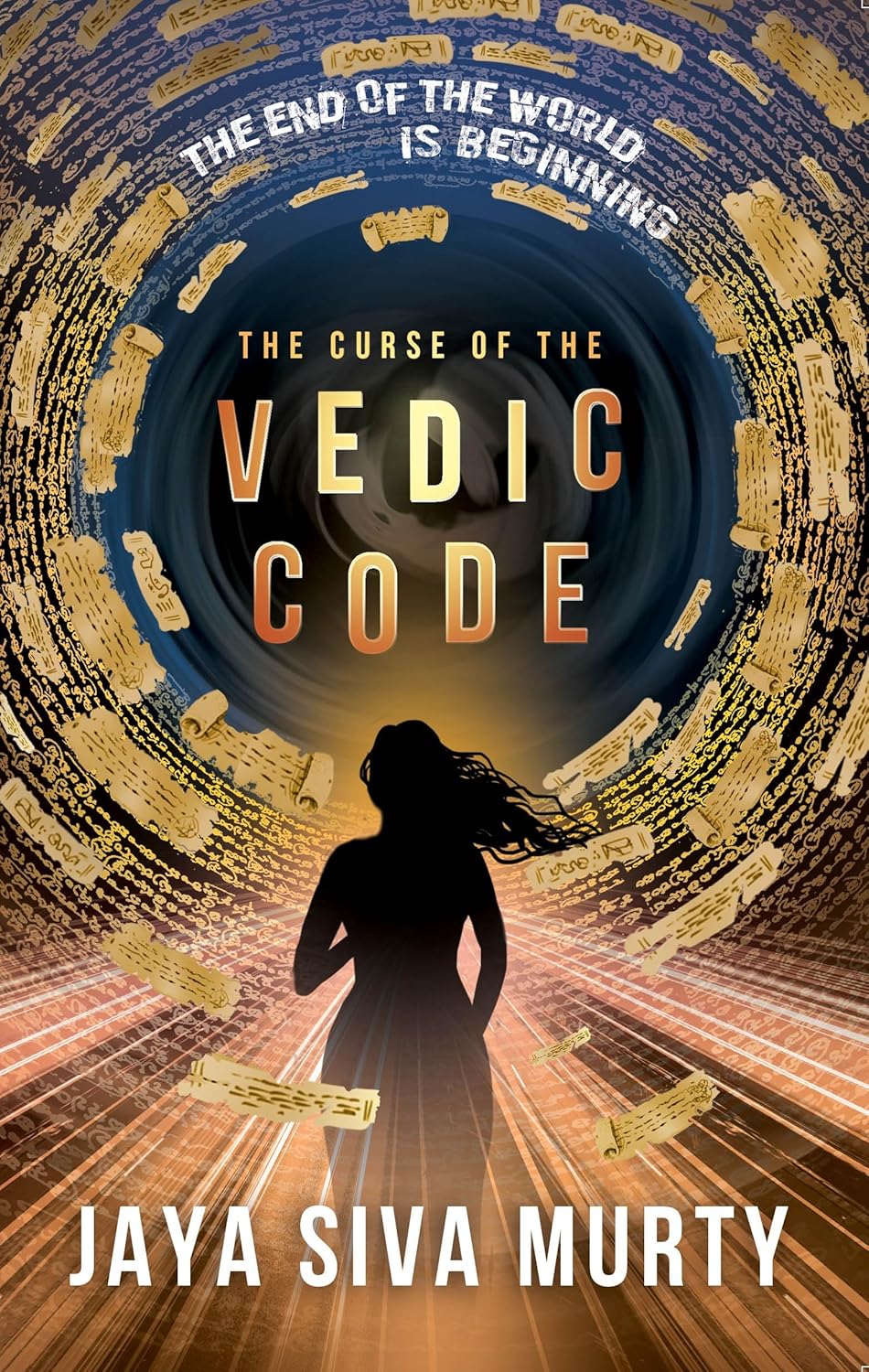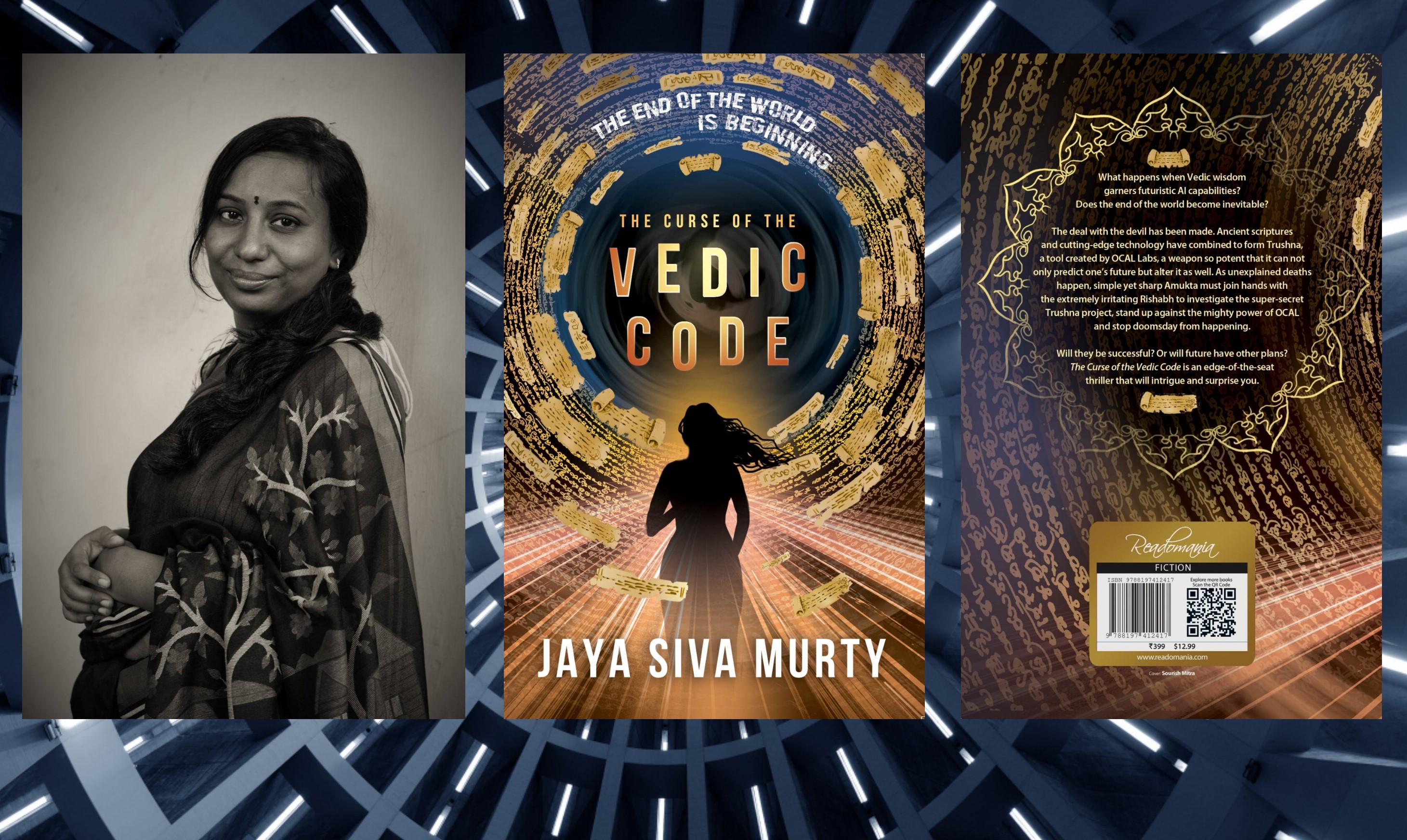Hello Jaya, congratulations on the release of The Curse of the Vedic Code!
Readomania: How are Vedic shastras relevant in today’s modern age?
Jaya: Vedic sciences, along with other ancient world traditions have been at the root of our civilization since thousands of years. Be it astrology, astronomy, medicine, mathematics…many modern scientists are now studying Vedic shastras to build a deeper knowledge. However, the education system that we’ve had, with its colonial influence, has kept us away from Vedic learning, leading us to think that Vedic shastras are perhaps redundant. While modern thinkers may still be of that mindset, I feel that more than questioning its relevance, the onus lies on us to not let this vast heritage of ours disappear. Just because we don’t understand it, doesn’t mean it’s bad. These were designed using laws based on nature and natural systems. We need to learn more and delve deeper before we can judge its value. We have something that many other civilizations do not have, and we need to realize and appreciate its value.
Readomania: What inspired you to combine Vedic wisdom with futuristic AI technology in your novel? Were there any particular texts or philosophies that influenced you to write your book?
Jaya: The rich vastness of our Vedic wisdom has always fascinated me. Astrology is one ansham of Atharva veda. Nadi shastra per se has captured my imagination, as how a person can see someone’s thumbprint or feel their pulse and talk about their past, present and future.
Similarly, the growing incidents of AI’s misuse, not just with the commoner, but also with industry leaders, has been on my mind. And of these two aspects was born the idea that what would happen if the absolute wisdom, would merge with the ultimate weapon. While there were no specific texts that I leaned on, I read some of Sri BV Raman’s work, and had conversations with astrologers and seers, who shaped my thought process. First hand life experiences of people also helped shape the narrative.

Readomania: The fusion of ancient knowledge with cutting-edge technology is central to the plot. How did you balance these two concepts—ancient scriptures and modern tech—while maintaining an engaging story?
Jaya: The thought that our rich heritage is being replaced by western ideologies has often bothered me. Not just Veda shastras, but also our heritage of handloom, handicrafts, languages. We are so enamoured with fast lifestyles and fast fashion, we forget the wealth that we possess. Also, our increasing dependence on technology worries me. I think the story formed the link between these two aspects, and I started questioning ‘what if’ which led to the story.
Readomania: Can you explain the metaphorical or literal role of "the deal with the devil" in the book? How does it drive the characters' motivations and the stakes of the plot?
Jaya: It’s interesting to see that the same action—like a theft—can be considered both good and evil. Good, for the thief, for it earns him money to satisfy a need—perhaps someone in his family is unwell. Evil—for it robs another person of their life’s hard earnings. The devil is symbolic to everything that is evil in the world. Something that isn’t morally right and causes loss to a person in any way. Here, the repercussions are huge—the balance hanging between life and death, power and submission. And these, drive the motivations of our characters.
Readomania: Given that Trushna can alter the future, what ethical dilemmas does it pose for the characters in the novel? Do you explore how such technology could affect humanity at large?
Jaya: Today AI is a field where the ethical dilemmas are most pronounced—it is after all changing the way we work and live. Here too, our protagonists face the dilemma of information misuse, data privacy, harm to human life etc. As is the case with any technological advancement—there will be good, but along with a sizable chunk of the bad. While regulations will soon be necessary to prevent misuse of technology for harming people, we know too well that the wrongdoers are way ahead of the good guys. And so we have to make that conscious change to keep ourselves safe.
Readomania: Amukta and Rishabh seem to have a tense but necessary partnership. How did you approach creating their dynamic, and how does their relationship evolve throughout the book?
Jaya: Amukta and Rishabh drive the story forward. The dynamic between them is created through their different personalities. It is a love-hate relationship created through the idea that we are constantly seeking support, and our journeys are seldom alone, and always involve people.
Readomania: This book is an edge-of-the-seat thriller. What strategies did you use to keep the pacing fast and the suspense high throughout the narrative?
Jaya: The idea was to create the kind of story I’d generally like to read and so creating a roller-coaster ride was essential for me. I did not want the story to slow its pace, and I wanted to build sufficient tension throughout. My reader had to be engaged at every point of the story. I planned it out on sheets of paper, and even on the board with a piece of chalk, to check out various scenarios, and when I wanted what to unfold. It was a messy, chaotic and absolutely fun thing to do!
Readomania: The idea of altering one’s future raises questions about fate and free will. How does the novel explore these themes?
Jaya: Yes, fate and free will are ultimately entwined. Even astrologers will predict the most-likely scenario, and that may or may not come true—because it is ultimately one’s actions that determine the path. In fact, the astrologer I spoke to while writing this said—answers may come true and they may not come true. Much will depend on the question that is asked, and more will depend on the action that the individual takes. This means that it is ultimately on an individual to question themselves constantly and choose what’s right. The novel explores these themes in various contexts, as alternate realities are generated through changes in actions. I wouldn’t want to say more than that for the risk of giving out spoilers.
Readomania: The title mentions "the curse”. What exactly is the curse within the story, and how does it affect the characters and the world they inhabit?
Jaya: The curse in context to this story is the evils of AI. Today AI is doing a lot of good, and showcasing the potential to do more. However, on the flipside, it is also leading to more scams, and super AI has the potential of being weaponized as well. This is the aspect that affects the characters, who choose not to adapt the ‘chalta hai’ attitude, and stand up and fight against it.
Readomania: Can you describe your writing process? Did you face any particular challenges while developing such a complex and multifaceted story?
Jaya: Once the idea had germinated in my mind, I closed myself in a room and started writing it down. I’d set a target of a few thousand words each day, and kept pen and paper ready with me on all sides. Once you start writing a story, the characters live in you, and I could visualize them doing various things. I wrote down aspects, some of which I used—many I discarded too. I created a timeline of events, so I didn’t mess the flow—a lesson learned when I was doing my first book. After I had finished the story, I got my beta readers to read and identify the gaps that I had missed. Finally, thanks to the fine job by Indrani at Readomania, we identified the inconsistencies and addressed them.
Readomania: What do you hope readers will feel or think after finishing The Curse of the Vedic Code? Are there specific takeaways or emotions you're hoping to evoke?
Jaya: I hope readers will enjoy the journey this story has taken. Reading a good book always leaves you with a sense of contentment with all loose ends tied up—I hope this book will do that. On a deeper level, I hope readers will appreciate the wealth of our ancient wisdom and our vibrant culture a little more. And finally, I hope they will be more conscious of their online footprint.
Readomania: What kind of books did you love growing up and how did they shape you as an author?
Jaya: I loved Enid Blyton when I was very young, and grew up reading those a lot. This was followed by O Henry, Roald Dahl, Agatha Christie, Wodehouse, Ludlum, Archer etc. Later years I explored Khushwant Singh, Anuja Chauhan, Friedrick Backman, Gerald Durrell, Paulo Coelho, James Herriott. I love pacy books that can hold my attention, or humour that can make me laugh—I find that to be a real talent in an author if their printed word can make you smile. My sister and brother would get me books as gifts, which encouraged my habit to read and write. Supportive teachers in school, especially my 8th grade English teacher Ms Vibha, would read my poetry and give feedback. Though average in other subjects, I’d ace the English exam everytime, which helped build my confidence. I got into copywriting, worked with agencies like Triton in Hyderabad and had the chance to associate with national ad campaigns as well.
Readomania: Is there a possibility of a sequel or a continuation of this story? Can we expect more explorations of Vedic wisdom in your future works?
Jaya: I’d love to explore more with the characters in this story, and a sequel to this is already playing out in my mind. However, this is still at a very early stage. As for future works, I won’t limit myself to Vedic wisdom, but would definitely look at stories that highlight our culture and take our rich Indian heritage forward.
Readomania: Thank you for talking to us. We wish you the very best for all your future endeavours! The book is available on Amazon for readers. Click here.

A writer since the age of ten, when her work first got published, Jaya Siva Murty pursued an MBA from Osmania University, Hyderabad. From getting work published in magazines like ‘Times of India’, ‘Savvy’ and Economic Times, she worked for advertising agencies Triton and OTS, worked as a Deputy Editor in a Vizag based magazine called Yo! Vizag and is currently Head Of Communications at Bhagavatula Charitable Trust, an NGO working in rural Andhra. Born and brought up in Lucknow, she studied in Hyderabad, lived in remote tribal and rural villages and finally settled in Visakhapatnam. She is also a member of the prestigious Crafts Council of Andhra Pradesh and Executive Committee member of WICCI. With a debut foray into novella writing with ‘Canvas of Dreams’, that was published by Indireads Publishing, she hopes that she’ll be able to tell many more stories about India and its myriad and vibrant cultural shades.


Comments